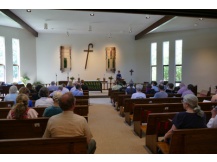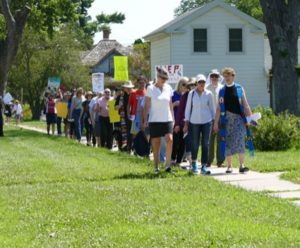Twelfth Sunday after Pentecost
September 1, 2019
Good Shepherd Lutheran Church
Decorah, Iowa
Rev. Amy Zalk Larson
Click here to read scripture passages for the day.
Beloved of God, grace to you and peace in the name of Jesus.
Everything I ever needed to know, I learned at the dinner table: Always start by saying thanks to God – good advice for meals and daily life. Say please a lot, too. Wait ‘til everyone has their food before you eat – ponder that as a life lesson. Don’t take more than you need. Remember the people who pick the strawberries on your table. Share the work – the cook doesn’t do the dishes.
It gets boring if you only talk about the weather, so talk about what really matters.
As a kid I learned lots about politics and religion at the table. Apparently, my family didn’t know you weren’t supposed to talk about those things. Instead, at family meals we learned how to have civil conversations about tough topics. We learned it was important to make a clear argument grounded in facts and crucial to keep an open mind. We learned to ask good questions, to listen more than we spoke.
I’m so grateful for all the manners and life lessons I’ve learned at the dinner table and now try to pass on to my own kids.
Yet I didn’t just learn etiquette and pearls of wisdom. I’ve been shaped as a person by time around the family table – formed by the community, laughter, compassion and wisdom that happens there.
My parents lectured plenty, but they also worked to live out the advice they gave us at the dinner table. My dad showed us that family is a priority by trying to be home in time for supper even as a busy lawyer. My mom welcomed all sorts of interesting characters to our dinner table and so, modeled what it is to be inclusive. Their actions, much more than their words, are what made dinners so formative.
Meals have been formative for the followers of Jesus since Jesus walked the earth 2000 year ago. Then and now, Jesus has used meals to both teach and shape us. So, whether our childhood or cur- rent dinner tables feel life-giving, conflicted or lonely, we all share in a large table fellowship of love and forgiveness.
The Gospels record a number of instances of Jesus teaching during meals. And it’d be easy to think that he’s just imparting wisdom as he teaches. That’s especially true with our reading for today. We often hear this passage as some good advice about how to be humble and not get embarrassed by choosing too lofty a seat, as well as some wise words and the importance of inclusion.
Yet there’s so much more happening here. Jesus doesn’t just lecture and advise. He also lives out everything that he teaches at meals.
So, in our Gospel passage today, when Jesus describes someone choosing the lower place who’s then lifted up, and when he says, “Those who humble themselves will be exalted”, he’s describing the path of his own life.
Jesus chose to leave his high place of honor as part of God’s very self in order to take on human form and experience all our lowliness and humiliations.
As the letter to the Philippians puts it, Jesus was in the very form of God yet did not consider equality with God something to be grasped. Instead, he humbled himself and took on human form, even undergoing death. Jesus willingly took a lower place to come and join us where we are – to experience all the suffering and struggle we go through.
Then God raised him up, exalted him, and gave him a place of honor at God’s right hand. Jesus was raised not for his own glory but to lift up all of humanity – to draw us all into the rich, abundant life God intends for us to know.
Jesus has shared our sufferings and so now we share in his resurrected new life. Jesus embodies his wisdom about humility and exultation, for our sake.
Similarly, when Jesus tells us to invite those who seem unworthy, those who have no way to reciprocate and nothing to offer, he is talking about what he does. Jesus calls us all to his table although we can never be worthy of the invitation, although we can do nothing to repay his generous welcome of us.
Jesus doesn’t just dispense advice at the dinner table, which is good news for us – because his life lessons are pretty demanding and hard to follow.
Thankfully, by his actions, Jesus shapes us into people who can live out the wisdom he gives us. By entering our struggle and raising us up, Jesus makes it possible for us to live with humility, to let go of posturing, pride and vainglory. When we know we are honored and valued by God we don’t have to try to attain status on our own.
In the same way, being welcomed by Jesus to his table is what makes it possible for us to open our tables to others, to include everyone at the feast. Jesus embodies the essential wisdom he shares. He lives it out for our sake.
Jesus gathers us at his table where we are taught and blessed, shaped and formed. Here we are given everything we need. As Jesus lives out the wisdom, compassion and generosity of God for us, for you, here we are made into God’s people.
So, come and eat. And notice, when it’s time for the meal we’ll start, as Jesus did, by saying, thanks. Everything you need is given and lived here for you.
Let’s take a moment for silent prayer.






